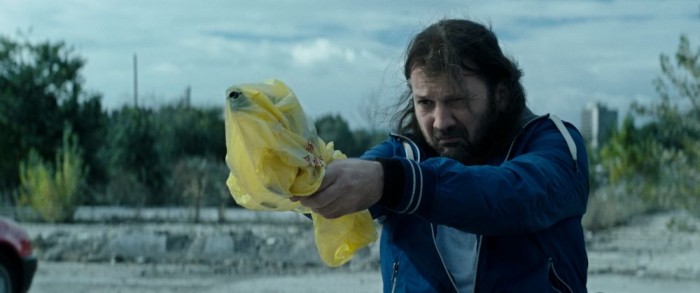
Orla Smith.
There isn’t much to say about Kills on Wheels. That’s saying something, for a film that seems built to stand out. This Hungarian submission for last year’s foreign language Oscar has crafted its appeal around an eye catching premise: it has been sold as a ‘buddy-movie about a wheelchair-using gang of assassins. If your first thought is recent capers starring older veterans such as Michael Caine and Morgan Freeman, you’re off the mark. The poster for Kills on Wheels shows a young man in a wheelchair, posing proudly with a gun in his hand. This isn’t a silly comedy about pensioners past their prime. It is a film that attempts to give young (or younger) disabled people their own action stars.
The film’s exploration of what advantages disability might bring to a criminal is its most interesting element. The central trio includes two young men – Zoli and Barba – who share a room in a rehabilitation facility, and an older man they meet named Rupasov, who has recently been released from prison. Rupasov is a hitman who, in one of the film’s only sparks of wit and imagination, is able to kill people by hiding his gun in a plastic bag placed on his wheelchair. Nobody suspects a thing. In a busy public square, no-one spares him a single glance of suspicion. Kills on Wheels touches on ideas of society’s precious attitude towards the disabled ― but it gets distracted by the clichés of the common crime drama along the way, failing to dig deeper.
//www.youtube.com/watch?v=mF3GWhtoFg8
Thankfully, the film itself doesn’t hold those precious attitudes. The disabled main characters never feel as though they are defined by their disabilities, but their characterisation is still thin. Director Attila Till stated: ‘It was crucial to me to make a movie about disabled people where they finally aren’t played by actors, but get the opportunity to act themselves and be the real heroes’. It’s a commendable sentiment, and it’s refreshing to see actual disabled people taking on disabled roles. They inhabit their characters naturally and with confidence, but are hindered by uninteresting material.
The film’s most worrying element is its attitude towards women. Women are only ever visible as worrying mothers, nurturers and objects of desire. Even then, they are given scarcely little screen time ― this being a film chiefly centred on male relationships ― but misogyny is rarely ever fully out of the picture. In one scene, when the central trio are fishing together, one of the younger characters goes on a sudden tirade that is unspeakably misogynistic: he complains about how their nurses in the rehabilitation home ‘totally lack sexuality’, and it gets worse from there. His thoughts are then reinforced by an older character. This is a film that attempts to be uplifting and entertaining, so why is it that its director has decided to alienate and insult all of his female viewers for no rhyme or reason?

Kills on Wheels
As that behaviour may suggest, we are given little reason to like these characters, and they are given little reason to like each other. Till introduces a ‘life or death’ medical plotline relating to one of the main character’s disability, and it seems incredibly forced. For a filmmaker who preaches the virtues of positive representation of disabled people on screen, he isn’t doing a particularly good job of letting them live freely within their own narratives. This extraneous plotline is unnecessary and convoluted ― and on top of all that, it asks us to care about someone who doesn’t feel like a real human being in the first place, let alone a sympathetic one.
Kills on Wheels is competently crafted and performed, but incompetently scripted and characterised. Despite its eye-catching premise, it is indistinguishable from any other wannabe crime saga. This film could have been commendable for allowing disabled people to exist in the kind of narrative usually reserved for able-bodied people, or it could have been commendable for exploring the way disabled people are treated in society and the unforeseen advantages that could afford them in those sorts of narratives. It fails to do either successfully.
We hope you're enjoying BRWC. You should check us out on our social channels, subscribe to our newsletter, and tell your friends. BRWC is short for battleroyalewithcheese.
Trending on BRWC:

Civil War: The BRWC Review












NO COMMENTS